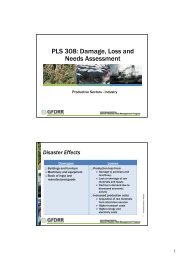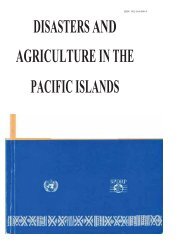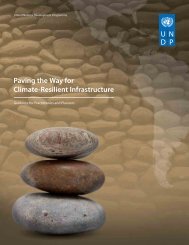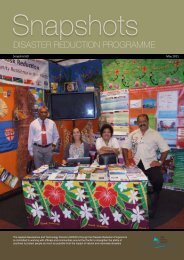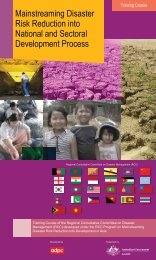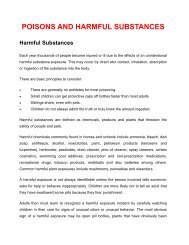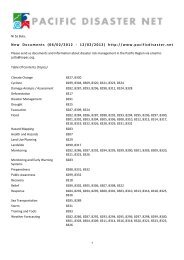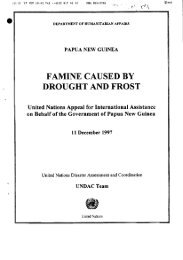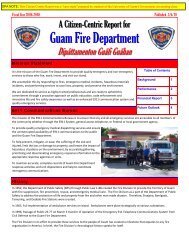A global review of disaster reduction initiatives - Welcome to the ...
A global review of disaster reduction initiatives - Welcome to the ...
A global review of disaster reduction initiatives - Welcome to the ...
You also want an ePaper? Increase the reach of your titles
YUMPU automatically turns print PDFs into web optimized ePapers that Google loves.
Living with risk - focus on <strong>disaster</strong> risk <strong>reduction</strong>1Linking environment and <strong>disaster</strong> <strong>reduction</strong> activities• Assessment <strong>of</strong> environmental problems linked <strong>to</strong> hazards based on reliable sources <strong>of</strong> existing information,mapping <strong>of</strong> environmentally sensitive areas, description <strong>of</strong> <strong>the</strong> characteristics <strong>of</strong> <strong>the</strong> environmentand development trends in <strong>the</strong>se areas, assessment <strong>of</strong> impacts and <strong>the</strong> need for additional data.• Examination <strong>of</strong> environmental benefits <strong>to</strong> be drawn from <strong>disaster</strong> <strong>reduction</strong> activities throughoutsec<strong>to</strong>rs.• Moni<strong>to</strong>ring <strong>to</strong> provide information for decision-making purposes, e.g. removal <strong>of</strong> <strong>disaster</strong>-proneland from development (land-use plans enable local governments <strong>to</strong> ga<strong>the</strong>r and analyse informationabout <strong>the</strong> suitability <strong>of</strong> land for development, so that <strong>the</strong> limitations <strong>of</strong> hazard-prone areas are unders<strong>to</strong>odby policy makers, potential inves<strong>to</strong>rs and community residents).• Environmental <strong>to</strong>ols for <strong>disaster</strong> <strong>reduction</strong> purposes: regula<strong>to</strong>ry (zoning, subdivision regulations,building codes, special ordinances), incentives (tax incentives, transfers <strong>of</strong> development rights, easements,land purchases, voluntary agreements, donations, leases, covenants, charitable deductions),programmes (conservation/res<strong>to</strong>ration <strong>of</strong> ecosystems, wildlife, wetlands), hazard control and mitigation,water/watershed, coastal-zone management.extreme events, and an appraisal <strong>of</strong> alternativesolutions <strong>to</strong> an exclusively engineeringapproach.There is growing recognition that by followingprinciples <strong>of</strong> wise environmental management,increased hazard protection as well as economicbenefits can be provided by <strong>the</strong> natural environment.This can be accomplished by buildingnational and local capacities, exchangingexperience and information regionally andengaging programme and investment partnersinternationally.The wealth <strong>of</strong> information and knowledgefrom both environmental and <strong>disaster</strong> managementstudies should be mutually beneficial.Both areas are inherently multi-disciplinaryand dynamic in <strong>the</strong>ir approach and analysis <strong>of</strong><strong>the</strong> socio-environmental nexus. Institutionally,both have been, and largely continue <strong>to</strong> be,operated by <strong>the</strong> public sec<strong>to</strong>r and NGOs. Similar<strong>to</strong>ols are continuously being refined in bothfields, namely vulnerability indexing, inven<strong>to</strong>rymechanisms, educational programmes for publicawareness and impact assessments.Encompassing long-term comprehensive goals<strong>to</strong> manage growth, development and land useimplies incorporating an effective environmentalcomponent in<strong>to</strong> <strong>disaster</strong> <strong>reduction</strong> strategies.Adapted, sustainable and integrated management<strong>of</strong> natural resources, including reforestationschemes, proper land use and judicioussettlements should increase <strong>the</strong> resilience<strong>of</strong> communities <strong>to</strong> <strong>disaster</strong>s by reversing currenttrends <strong>of</strong> environmental degradation anddealing with hazard management in a comprehensiveway. Secondary benefits expected from<strong>the</strong> introduction <strong>of</strong> environmental projects in<strong>disaster</strong> <strong>reduction</strong> programmes include socialacceptance, political feasibility and economicrationale.Disaster <strong>reduction</strong> and environmental managementshould become national priorities. Entitiesresponsible for <strong>disaster</strong> <strong>reduction</strong> shouldhave clear environmental mandates. Coordinatedand inter-agency programmes are needed<strong>to</strong> promote a holistic problem-solving strategy,justifying <strong>the</strong> protection and res<strong>to</strong>ration <strong>of</strong>natural functions <strong>of</strong> ecosystems, and assessingprogramme subsidies <strong>to</strong> create <strong>the</strong> right incentivesfor sustainability. Environmental accountingsystems that produce information suitedfor decision-making should reflect <strong>disaster</strong><strong>reduction</strong> considerations. Additional studiesare needed <strong>to</strong> improve systems <strong>of</strong> ecologicaleconomic accounting. Translating environmentalresources and services in<strong>to</strong> conventionaleconomic figures is still very much a challenge.As <strong>disaster</strong> <strong>reduction</strong> and environment have alot in common, <strong>the</strong> <strong>disaster</strong> <strong>reduction</strong> communityshould look closely at experiencegained in promoting environmental policies.The environmental community has been promotingits agenda for 30 years. Today, <strong>the</strong> role<strong>of</strong> environmental strategies <strong>to</strong> achieve sustainabledevelopment is now no longer questionedand <strong>disaster</strong> <strong>reduction</strong> policy must follow asimilar path.37



